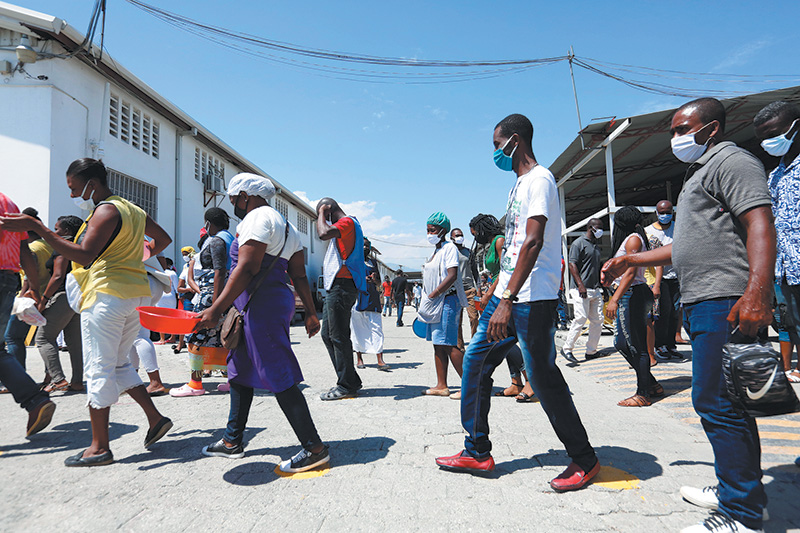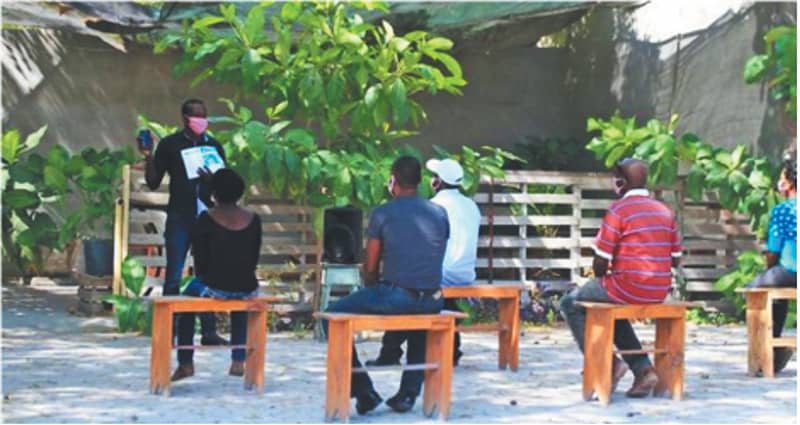
When Parish Twinning Program of the Americas Executive Director Theresa Patterson began learning about the worldwide spread of COVID-19, she “felt powerless in the face of the pending onslaught.”
Four decades of experience supporting the people and parishes of Haiti made Patterson keenly aware that the impoverished country is “ill-equipped to handle a crisis of this magnitude.”
“I couldn’t imagine how we could urge people to wash their hands constantly when water is not readily accessible, how we could urge them to stay in their homes when the only way that they can feed their children is to stand in the hot sun for hours to sell a few dollars worth of goods,” said Patterson, a parishioner at St. Henry Church in Nashville. “How could we realistically expect them to practice social distancing when most live in close quarters with family and neighbors?”
The Haitian people are responding to the pandemic and adjusting their behavior as much as possible, but conditions have already worsened with food shortages and skyrocketing prices for necessities like hand sanitizer.
A lockdown has been in place since March 19 and schools and businesses are closed. The normally chaotic streets of the capital city Port-au-Prince have been significantly quieter. The U.S. Embassy in Haiti reports that a general curfew remains in place from 8 p.m. to 5 a.m. daily to help enforce social distancing.
Meetings of 10 or more people are discouraged and the government has advised people to wear masks when in public, even though it has been unable to provide a reliable source of personal protective gear.
The Parish Twinning Program has been making its own preparations as well.
“We have been in frequent communication with the staff at Visitation Clinic for several months to make sure that they are prepared for the coronavirus,” said Patterson, speaking about the healthcare facility in rural Petite Riviere de Nippes, Haiti, an outgrowth of the Parish Twinning Program.
Inside the clinic, “They have taken a proactive approach to prevent the spread of the virus,” Patterson said. “They have waiting patients practicing social distancing and are educating them on preventative measures.”
Visitation Clinic has not treated anyone with the COVID-19 virus but does continue to treat patients with other health issues while following new precautions and protocols.
Clinic staff have added hand washing stations in key areas near the clinic. They have shared coronavirus prevention tips with the community through the local radio station, one of the primary means of communication in Haiti, where internet access is scarce and unreliable.
Life-saving partnership
As part of a new initiative, the Parish Twinning Program is partnering with the Raising Haiti Foundation, an organization with a similar mission to PTPA, “to potentially save thousands of lives,” according to Patterson.
Raising Haiti received a grant to address preventative measures for COVID-19, and “with PTPA’s network, it was hoped that those measures could reach a substantial number of people and communities in Haiti,” Patterson said.
Several months ago, the Parish Twinning Program, Raising Haiti Foundation, and the Smallholder Farmers Alliance collaborated to consider ways and means of expanding PTPA’s relationships with parish leaders in Haiti.
Patterson has so far reached out to 18 of the Parish Twinning Program’s more than 300 parishes in Haiti to participate in a pilot program that will provide training and resource materials including brochures and masks, to be used in educating their communities about social distancing and prevention of the coronavirus.
Each parish in the pilot program will have a community leader who will receive training, and recruit nine other parish or community members to help distribute materials and share information about how to stay safe and prevent the spread of the virus.
PTPA pairs congregations in the United States with parishes in Haiti to provide material and financial assistance, and Raising Haiti also is hoping to use the U.S. side of the twinning model to advance the project. Raising Haiti is hosting a Zoom chat for all PTPA’s U.S. parishes, individuals and organizations to learn more about this effort on Sunday, May 10. “We are hoping to enlist many other organizations and groups to join us in this initiative,” said Patterson.
More mountains
According to the World Health Organization, there have only been 76 cases of coronavirus confirmed in Haiti and six deaths, but that is likely a vast undercount, since the Ministry of Health purportedly has only 1,000 tests for a country of 11 million people.
“No one doubts that those numbers are a tiny fraction of people who have been infected or have died from the virus due to a lack of testing,” Patterson said. If coronavirus cases do spike, Haiti lacks both intensive care beds and ventilators to meet the need.

“It breaks my heart to think about how so many Haitians will ‘suffer in silence’ from COVID-19 due to poverty and an incapacitated health system,” said Patterson.
“Dèyè mòn gen mòn” is a popular Haitian Creole saying, translated as “Beyond the mountains, more mountains.” One interpretation of the saying is that after surmounting one great obstacle, you gain a clear view of the next one. Coronavirus is the next mountain for the Haitian people to climb, and they have climbed so many in just the last decade: a devastating earthquake, hurricanes, cholera, political upheaval and violence.
Parish Twinning Program staff and volunteers have been working from Nashville and on the ground in Haiti to serve the Haitian people through all of these challenges, doing everything they can, and then “trusting that God will keep them in his loving care,” said Patterson.









